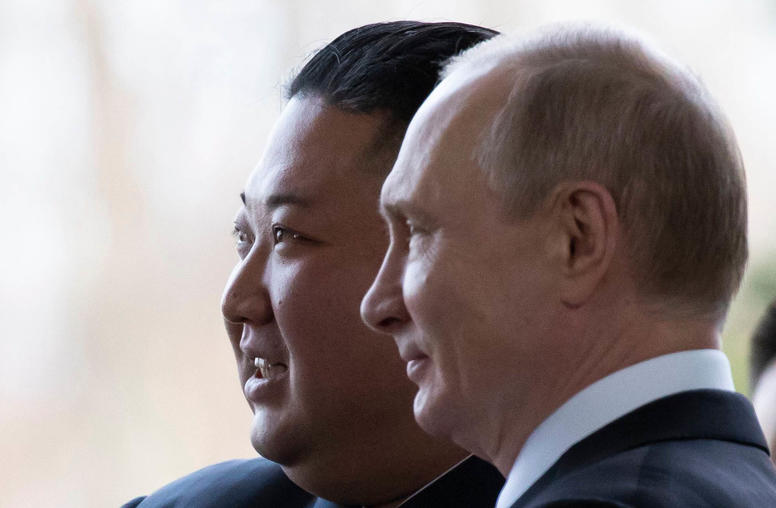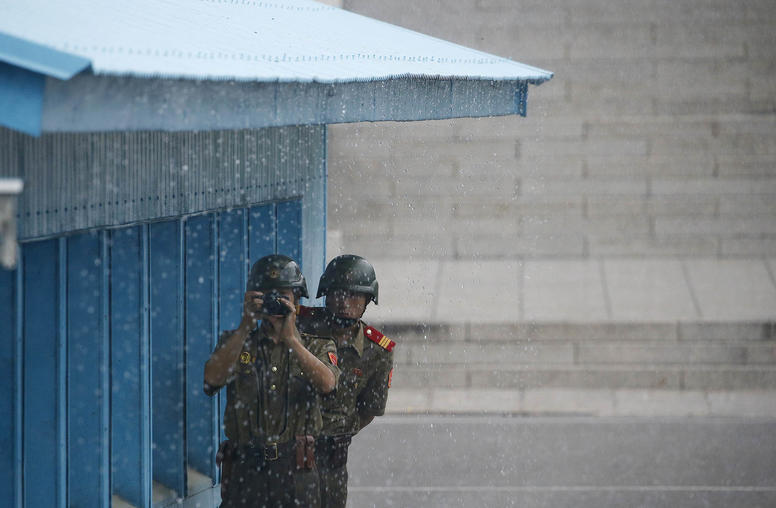On the Issues: North Korea
What are the repercussions of Pyongyang's and Washington's recent steps on the nuclear issue? Is this a major shift or a calculated short-term move? Read analysis from Senior Fellow John S. Park.
Image on right: In this image from television, North Korea's 60-foot-tall cooling tower at its main reactor complex is destroyed, Friday, June 27, 2008, in Yongbyon, North Korea. North Korea destroyed the most visible symbol of its nuclear weapons program in a sign of its commitment to stop making plutonium for atomic bombs. (AP Photo)
 Since the early 1990s, the nuclear issue has been a point of contention between Pyongyang and Washington. The latest episode occurred on June 26, when, in return for submitting its nuclear declaration, Pyongyang received confirmation that President Bush would notify Congress of his intention to remove North Korea from the State Sponsors of Terrorism List (SSTL) and lift Trading With the Enemy Act (TWEA) restrictions. At a White House press conference the next morning, Bush made a formal announcement to this end.
Since the early 1990s, the nuclear issue has been a point of contention between Pyongyang and Washington. The latest episode occurred on June 26, when, in return for submitting its nuclear declaration, Pyongyang received confirmation that President Bush would notify Congress of his intention to remove North Korea from the State Sponsors of Terrorism List (SSTL) and lift Trading With the Enemy Act (TWEA) restrictions. At a White House press conference the next morning, Bush made a formal announcement to this end.
 John Park is a senior fellow for Northeast Asia in the Center for Conflict Analysis and Prevention and director of the Institute’s Korea Working Group. In this interview, he discusses the repercussions of North Korea’s latest move.
John Park is a senior fellow for Northeast Asia in the Center for Conflict Analysis and Prevention and director of the Institute’s Korea Working Group. In this interview, he discusses the repercussions of North Korea’s latest move.
- What does Pyongyang have to gain through this action? What about Washington?
- Secretary Rice said that North Korea's disclosure does not fully address U.S. concerns on the issue. What is missing? If Pyongyang did not fully disclose everything, did Washington act prematurely?
- Does the agreement mean the final end of North Korea's nuclear activities? Or is it just another chapter in the ongoing story of the country's nuclear programs?
- What are the implications of this decision in terms of relations between the two Koreas?
- What role do the Six-Party Talks members in East Asia play?
- Describe USIP's work on Korean Peninsular issues.
What does Pyongyang have to gain through this action? What about Washington?
While the U.S. actions regarding TWEA and SSTL, which require a 45-day notification period before implementation, are symbolic gains for Pyongyang, there are a number of other pieces of U.S. legislation that effectively serve as sanctions on North Korea. A more tangible benefit was a shipment of U.S. food aid that arrived in North Korea soon after the submission of the declaration. However, the State Department officially commented that this aid is separate from the ongoing nuclear negotiations.
For Washington, the nuclear declaration is an important opportunity to directly address North Korea's plutonium-based weapons program. The U.S. will now primarily focus on developing a verification mechanism to confirm the declaration. Verification work lays the foundation for phase III activities: nuclear rollback in North Korea.
In accordance with an April understanding between U.S. Assistant Secretary of State Christopher Hill and DPRK Vice Foreign Minister Kim Gye-kwan, the main focus of the nuclear declaration was placed on Pyongyang's plutonium-based weapons program. U.S. concerns about two other issues—the uranium enrichment program and nuclear cooperation with Syria—were listed separately and "acknowledged" by North Korea.
While emphasizing the need for North Korea to address these two issues, Secretary Rice pointed out that Pyongyang's plutonium disclosure was sufficient to move the Six-Party Talks' denuclearization process forward. The next urgent task will be developing a stringent verification mechanism to confirm what Pyongyang has submitted in its declaration. The Bush administration's decision to initiate the process of removing North Korea from SSTL and lifting TWEA restrictions is not deemed to be premature because restarting the denuclearization process is the immediate objective.
As the process gains momentum, Washington's focus will shift to the two remaining issues of uranium enrichment and nuclear cooperation with Syria. While full disclosure on all three issues in the declaration would have been preferred, the Bush administration needed to start the denuclearization process in order to optimize the administration’s remaining time. Hence, the administration decided on a sequential arrangement, which prioritized the plutonium issue above the other two. Moreover, as Pyongyang had already conducted a nuclear test of its plutonium device and had a stockpile of others, the plutonium issue was viewed as the clear and present danger to U.S. national security.
The nuclear declaration submission and the subsequent Yongbyon reactor cooling tower implosion (which occurred on June 27) comprise another chapter in the story.
North Korea's declaration bridges phase II (disabling the Yongbyon complex and submitting a declaration) and phase III (nuclear dismantlement). Verifying what Pyongyang has declared in its declaration will be required before the plutonium-based weapons program can be dismantled with a high degree of confidence.
What are the implications of this decision in terms of relations between the two Koreas?
Since the February inauguration of the conservative Lee Myung-bak administration in Seoul, relations between the two Koreas have been cool. In a departure from his predecessor, President Lee has made aid to and economic cooperation with North Korea contingent upon progress in denuclearization. Seoul's stance on food aid is that North Korea must formally request it before South Korea supplies it. Feeling insulted by this change in policy, Pyongyang sought food aid elsewhere. President Lee's recent offer to meet with Kim Jong Il was turned down by Pyongyang, which criticizes Lee for being pro-U.S.
What role do the Six-Party Talks members in East Asia play?
While the other members of the Six-Party Talks (China, South Korea, Japan and Russia) remain an integral part of denuclearization efforts on the Korean Peninsula, at this stage bilateral U.S.-DPRK negotiations have driven the dialogue. When the talks re-open in Beijing on July 10, the working groups that focus on denuclearization and energy assistance, respectively, will become more active. South Korea and China will play larger roles within these groups.
Describe USIP's work on Korean Peninsular issues.
USIP regularly convenes the Korea Working Group (KWG), which brings together Korea specialists in Washington who are current or former government officials focused on peninsular security, political, economic, and humanitarian issues. Key findings on pressing topics related to the Korean Peninsula are published as USIP reports. KWG has hosted events with Deputy Secretary of State John Negroponte, Assistant Secretary of State Christopher Hill, nuclear expert David Albright, and economist Marcus Noland. USIP also runs a research project with the Center for Strategic and International Studies to examine Chinese views of internal developments in North Korea.
The views expressed here are not necessarily those of USIP, which does not advocate specific policy positions.



